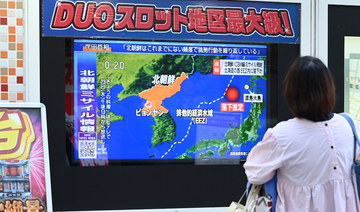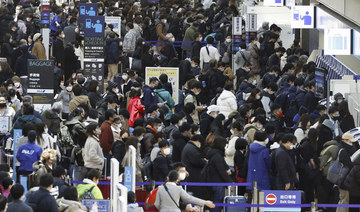TOKYO: Japanese Prime Minister Fumio Kishida begins a weeklong trip Monday to strengthen military ties with Europe and Britain and bring into focus the Japan-US alliance at a summit in Washington, as Japan breaks from its postwar restraint to take on more offensive roles with an eye toward China.
Kishida’s talks with US President Joe Biden on Friday will highlight his five-nation tour that also takes him to France, Italy, Britain and Canada — some of Group of Seven nations Japan has stepped up defense ties with in recent years. His first stop is Paris on Monday evening.
Kishida said his summit with Biden will underscore the strength of the Japan-US alliance and how the two countries can work more closely under Japan’s new security and defense strategies.
Japan in December adopted key security and defense reforms, including a counterstrike capability that makes a break from the country’s exclusively self-defense-only postwar principle. Japan says the current deployment of missile interceptors is insufficient to defend it from rapid weapons advancement in China and North Korea.
Kishida said he will explain to Biden the new strategy, under which Japan is also reinforcing defenses on its southwestern islands close to Taiwan, including Yonaguni and Ishigaki, where new bases are being constructed.
“Will will discuss further strengthening of the Japan-US alliance, and how we work together to achieve a fee and open Indo-Pacific,” Kishida told a NHK national television talk show Sunday, referring to a vision of national and economic security cooperation the two countries promote to counter China’s growing military and economic influence.
Under the new strategies, Japan plans to start deploying in 2026 long-range cruise missiles that can reach potential targets in China, nearly double its defense budget within five years to a NATO standard of about 2 percent of GDP from the current 1 percent, and improve cyberspace and intelligence capabilities.
The idea is to do as much as possible in a short time as some experts see growing risks that Chinese President Xi Jingpin may take action against self-ruled Taiwan, which Beijing claims as part of its territory.
Japan’s new strategy has been well received by the Biden administration and some members of the Congress. Experts say it would also widen cooperation with their main regional partners Australia and possibly South Korea.
“This is an opportunity to rethink and update the structure and the mechanisms of the alliance to reflect a much more capable partner that’s coming,” said Christopher Johnstone, senior adviser and Japan chair for the Center for Strategic and International Studies.
He said, however, that Japan’s focus on the strike capability and budget is a welcome but “a daunting agenda” that will require a lot of cooperation with the United States.
Paving the way for the summit, Japanese Defense Minister Yasukazu Hamada and Foreign Minister Yoshimasa Hayashi will fly to Washington to meet their American counterparts, Lloyd Austin and Antony Blinken, on Wednesday, followed by separate defense ministers’ talks Thursday.
The Biden administration, which also adopted its security strategy in October, expects Japan to assist in the supply and storage of fuel and munitions in case of a Taiwan emergency, experts say. Japan and the United States are also reportedly considering establishing a joint command.
During the talks at the White House, the two leaders are also expected to discuss China, North Korea’s nuclear and missile development as well as Russia’s war on Ukraine, Japanese officials said.
Cooperation in the area of supply chain and economic security will be also on the table. Last week, Japanese Economy and Industry Minister Yasutoshi Nishimura and US Secretary of Commerce Gina Raimondo disussed in Washington the importance to work together to promote and protect critical and emerging technologies, including semiconductors, and export controls to address competitiveness and security concerns.
During his trip, Kishida will seek to further strengthen bilateral military ties with four other countries, Japanese officials say.
Japan’s joint development and production of its F-X next generation fighter jet with Britain and Italy for a planned deployment in 2035 will be a top agenda item during his visits in Rome and London on Tuesday and Wednesday.
Japan and Britain have also been discussing a Reciprocal Access Agreement that would remove obstacles to holding joint military exercises in either country. Besides the Japan-US security treaty that allows US troops to station in Japan, Tokyo has a similar agreement only with Australia, and Britain would be second.
During his talks with French President Emmanuel Macron, Kishida is expected to share concern over China’s growing activity in the South Pacific and confirm stepping up joint military exercise between the two sides.
Japanese PM highlights security concerns on trip to Europe, US
https://arab.news/gkeqd
Japanese PM highlights security concerns on trip to Europe, US
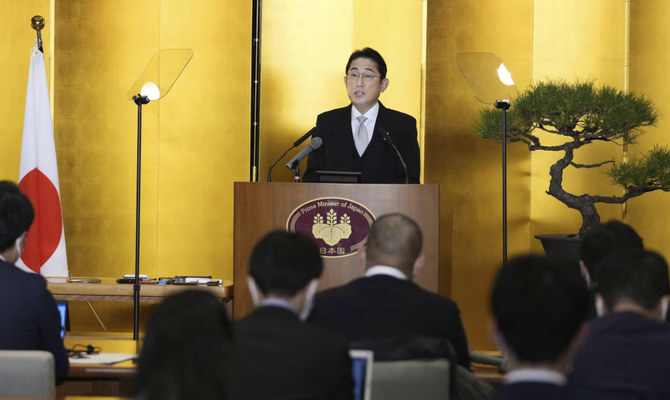
- Japan says the current deployment of missile interceptors is insufficient to defend it from rapid weapons advancement in China and North Korea
Suspected Kashmir rebels kill Indian air force corporal
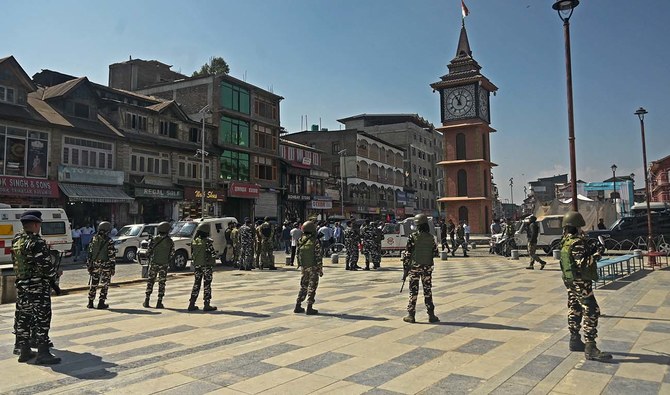
- Suspected rebels ambushed military convoy in Indian-administered Kashmir, Indian Air Force says
- Since 1989, rebel groups opposed to Indian rule have waged insurgency in disputed territory
SRINAGAR, India: An Indian air force member was killed and four more injured when suspected rebels ambushed a military convoy in Indian-administered Kashmir, an official statement said, as campaigning for national elections continues in the disputed territory.
The convoy was attacked by an unknown number of armed militants who sprayed automatic rifle fire toward at least one air force truck in the mountainous Poonch area, 200 kilometers (124 miles) south of the main city of Srinagar, the air force said in a statement.
Five air force personnel were hit in the firefight late Saturday and “one Air Warrior succumbed to his injuries later,” it said, identifying the dead man as a corporal.
A neighboring constituency took part in the first phase of India’s general election on April 19, and Poonch voters were originally scheduled to cast their ballots this week but the Election Commission of India has postponed the polling to May 25 because of inclement weather in recent days.
Kashmir has been divided between India and Pakistan since their independence in 1947, with both claiming the high-altitude territory in full but administering it in parts.
Since 1989, rebel groups opposed to Indian rule have waged an insurgency in Indian-controlled Kashmir, demanding either independence or a merger with Pakistan.
The conflict has left tens of thousands of civilians, soldiers and militants dead.
Rebel activity in the territory has registered an uptick since last month as campaigning for the elections picked up in the restive region.
In April, three suspected rebels were killed and a police officer and three soldiers wounded in three separate clashes across the territory.
Violence has drastically dropped since 2019, when Prime Minister Narendra Modi’s government revoked the region’s limited autonomy and stepped up a security chokehold.
Voting in India’s six-week-long national election, which started last month, will end on June 1.
Driver dies after crashing into White House perimeter gate, Secret Service says

- The driver was not immediately identified
WASHINGTON: A driver died after crashing a vehicle into a gate at the White House Saturday night, authorities said.
The driver was found dead in the vehicle following the crash shortly before 10:30 p.m. at an outer perimeter gate of the White House complex, the US Secret Service said in a statement.
Security protocols were implemented but there was no threat to the White House, the agency said.
The driver was not immediately identified.
The Secret Service will continue to investigate the matter, while turning over the fatal crash portion of the investigation to the Washington Metropolitan Police Department, the agency said.
Fake videos of Modi aides trigger political showdown in India election

- Indian police arrest nine people for circulating fake video of Indian Home Minister Amit Shah
- With more than 800 million Internet users, tackling misinformation in India is a huge challenge
BENGALURU/LUCKNOW: Manipulated videos are taking center stage as campaigning heats up in India’s election, with fake clips involving two top aides of Prime Minister Narendra Modi triggering police investigations and the arrest of some workers of his rival Congress party.
In what has been dubbed as India’s first AI election, Modi said last week fake voices were being used to purportedly show leaders making “statements that we have never even thought of,” calling it a conspiracy “to create tension in society.”
Indian police — already investigating the spread of fake videos showing Bollywood actors criticizing Modi — are now investigating a doctored online clip that showed federal home minister Amit Shah saying the ruling Bharatiya Janata Party will stop certain social guarantees for minorities, a subject sensitive for millions of voters.
Shah retorted on X, posting his “original” and the edited “fake” speech and alleging — without providing any evidence — that the main opposition Congress was behind the video it created to mislead the public. The minister said “directions have been issued to the police to address this issue.”
Indian police arrested at least nine people, including six members of Congress’ social media teams, in the states of Assam, Gujarat, Telangana and New Delhi last week for circulating the fake video, according to police statements.
Five of the Congress workers were released on bail, but the most high-profile arrest made by the cybercrime unit of New Delhi police came on Friday, when they detained a Congress national social media coordinator, Arun Reddy, for sharing the video. New Delhi is one region where Shah’s ministry directly controls police. Reddy has been sent into three-day custody.
The arrest has sparked protests from Congress workers with many posting on X using the #ReleaseArunReddy tag. Congress lawmaker Manickam Tagore said the arrest was an example of “authoritarian misuse of power by the regime.”
Congress’ head of social media, Supriya Shrinate, did not respond to messages and an email seeking comment.
MISINFORMATION
India’s election from April 19 to June 1 will be the world’s largest democratic event. With nearly a billion voters and more than 800 million Internet users, tackling the spread of misinformation is a high stakes job. It involves round-the-clock monitoring by police and election officials who often issue take down orders to Facebook and X as investigations start.
In India’s most populous state of Uttar Pradesh, more than 500 people keep tabs on online content, flagging controversial posts and coordinating with social media companies for their removal when needed, police chief Prashant Kumar told Reuters on Saturday.
Another fake video that sparked a storm last week showed Yogi Adityanath, the state’s chief minister, criticizing Modi for not doing enough for families of those who died in a 2019 militant attack. Though fact checkers said the video was created using different parts of an original clip, state police called it an “AI generated, deepfake.”
Using Internet address tracking, state police arrested a man named Shyam Gupta on May 2 who had shared the fake video post on X a day earlier, receiving over 3,000 views and 11 likes.
The police have accused Gupta of forgery and promoting enmity under Indian law provisions that can carry a jail term of up to seven years if convicted. Reuters could not reach him as he is currently serving a 14-day custody period.
“This person is not a tech guy. Had he been tech savvy, arresting him quickly would not have been possible,” said police officer Kumar.
Australian police shoot boy dead after stabbing with ‘hallmarks’ of terrorism

SYDNEY,: Australian police said on Sunday they had shot dead a boy after he stabbed a man in Western Australia’s capital Perth, in an attack authorities said indicated terrorism.
There were signs the 16-year-old, armed with a kitchen knife, had been radicalized online, state authorities said, adding they received calls from concerned members of the local Muslim community before the attack, which occurred late on Saturday night.
The attack, in the suburb of Willetton, had “hallmarks” of terrorism but was yet to be declared a terrorist act, police said.
“At this stage it appears that he acted solely and alone,” Western Australia Premier Roger Cook told a televised press conference in the state capital Perth, regarding the attacker.
The victim, stabbed in the back, was stable in hospital, authorities said.
Prime Minister Anthony Albanese said he had been briefed on the incident by police and intelligence agencies, which advised there was no ongoing threat.
“We are a peace-loving nation and there is no place for violent extremism in Australia,” Albanese said on social media platform X.
The incident comes after New South Wales police last month charged several boys with terrorism-related offenses in investigations following the stabbing of an Assyrian Christian bishop while he was giving a live-streamed sermon in Sydney, on April 15.
The attack on the bishop came only days after a stabbing spree killed six in the Sydney beachside suburb of Bondi.
Gun and knife crime is rare in Australia, which consistently ranks among the safest countries in the world, according to the federal government. (Reporting by Sam McKeith in Sydney; Editing by Christian Schmollinger and William Mallard)
North Korea’s UN ambassador says new sanctions monitoring groups will fail
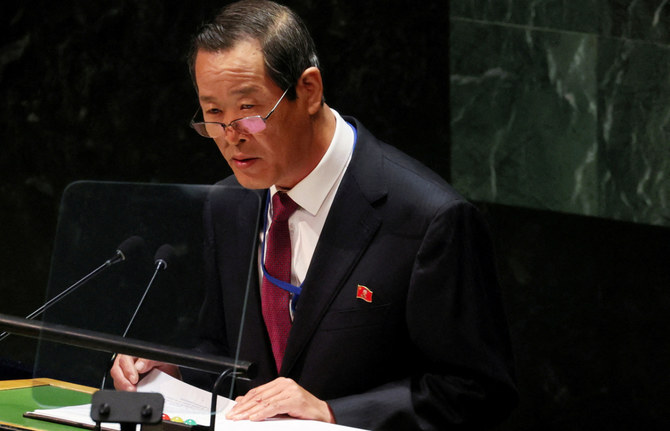
- Earlier this year, Russia vetoed the annual renewal of a panel of experts amid US-led accusations that North Korea has transferred weapons to Russia for use in its war in Ukraine
SEOUL: Efforts led by the US and other Western countries to form new groups to monitor sanctions on North Korea will fail, the country’s UN envoy said on Sunday, according to state media KCNA.
Ambassador Kim Song made the comment in response to a joint statement the US and its allies issued this week calling to continue the work of a UN panel of experts monitoring longstanding sanctions against Pyongyang for its nuclear weapons and missile programs.
Earlier this year, Russia vetoed the annual renewal of the panel amid US-led accusations that North Korea has transferred weapons to Russia for use in its war in Ukraine.
“The hostile forces may set up the second and third expert panels in the future but they are all bound to meet self-destruction with the passage of time,” KCNA quotes Kim as saying in a statement.
Last month, US Ambassador to the United Nations Linda Thomas-Greenfield visited the Demilitarized Zone, a heavily fortified border between the two Koreas, which remain technically at war and urged Russia and China to stop rewarding North Korea for its bad behavior.
Her trip came after Russia rejected the annual renewal of the multinational panel of experts that has over the past 15 years monitored the implementation of UN sanctions aimed at curbing North Korea’s nuclear and missile programs.



